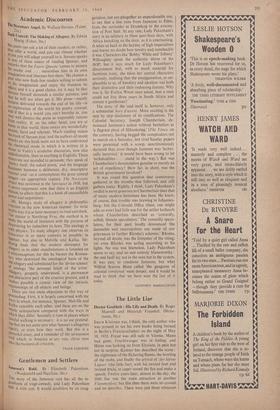Gentlemen and Settlers
Jameson's Raid. By Elizabeth Pakenham, (Weidenfeld and Nicolson, 36s.) I liE story of the Jameson raid has all the in- gredients of tragi-comedy, and Lady Pakenham tells it with zest. It would doubtless be an exag- geration, but not altogether an unpardonable one, to say that a line runs from Jameson to Eden, from the surrender at Doomkop to the evacua- tion of Port Said. At any rate, Lady Pakenham's story is as salutary in these post-Suez days, with Africa knocking on the door, as it is entertaining. It takes us back to the heyday of high imperialism and leaves no doubt how tawdry and ramshackle it was. Characters like 'Bobby' White and `Johnny' Willoughby speak the authentic idiom of the BOP; but it says much for Lady Pakenham's discernment that, with so much material for facetious irony, she takes her central characters seriously, realising that the amalgamation, so un- plausible to us, of banditry and idealism was both their distinctive and their endearing feature. Why was it, Sir Evelyn Wood once asked, that a man could not live three years in South Africa and remain a gentleman?
The story of the raid itself is, however, only a substantial hors d'reuvre. More exciting is the step by step disclosure of its ramifications. The Colonial Secretary, Joseph Chamberlain, de- nounced Jameson's action without hesitation as 'a flagrant piece of filibustering.' (The Times, on the contrary, having begged the conspirators not to march on a Saturday, lest rival Sunday papers were presented with a scoop, sanctimoniously declared that, even though Jameson was 'techni- cally incorrect,' it would have been wrong to let `technicalities . . . stand in the way.') But was Chamberlain's denunciation genuine or merely an act of expediency? How far, in short, was the British government involved?
It was round this question that controversy gathered in the months that followed, and still gathers today. Rightly, I think, Lady Pakenham's verdict is more generous to Chamberlain than that of many modern historians has been. He knew, of course, that trouble was brewing in Johannes- burg; but the Colonial Office (then, one might add, as now) had little use for the settler hotheads whom Chamberlain described as 'cowardly, selfish, blatant speculators.' The cowardly specu- lators, for their part, loudly denounced `the damnable and unscrupulous use made of our grievances to further Rhodes's schemes.' Rhodes, beyond all doubt, was the fomenter of the rising; yet even Rhodes was acting according to his lights. No one was blameless, Lady Pakenham seems to say, and no one entirely blameworthy : the real fault lay not in the men but in the system. It was easy to condemn Jameson, but what Wilfrid Scawen Blunt called 'the gangrene of colonial rowdyism' went deeper, and it would be mad to think that we have seen the last of it today.
GEOFFREY BARRACLOUGH


































 Previous page
Previous page